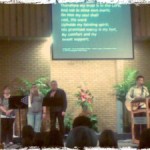Our church has been going through the book of Ephesians. We’re at the part where the Apostle Paul gives final instructions (more like marching orders) to his readers:
“Finally, be strong in the Lord and in the strength of his might. Put on the full armour of God, that you may be able to stand against the schemes of the devil…” (Eph. 6:10-11)
Paul calls us to know the opposition, and then stand firm against his scheme. And so during my reading this week, I worked through the contents page of a helpful book on the topic of spiritual warfare called “Precious remedies against Satan’s devices” by Thomas Brooks. I found it incredibly helpful. Have a look for yourself (I’ve marked in red the ones I found particularly helpful in my own walk):
SATAN’S DEVICES TO DRAW THE SOUL TO SIN [12 devices and their remedies]
- By presenting the bait and hiding the hook: For remedies, consider that
- we ought to keep at the greatest distance from sin and from playing with the bait
- sin is but a bitter sweet
- sin will usher in the greatest and the saddest losses
- sin is very deceitful and bewitching
- By painting sin with virtue’s colours: For remedies, consider that
- sin is never the less vile by being so painted
- the more sin is so painted the more dangerous it is
- we ought to look on sin with that eye with which within a few hours we shall see it
- sin cost the life-blood of the Lord Jesus
- By the extenuating and lessening of sin: For remedies, consider that
- sin which men account small brings God’s great wrath on men
- the giving way to a less sin makes way for the committing of a greater
- it is sad to stand with God for a trifle
- often there is most danger in the smallest sins
- the saints have chosen to suffer greatly rather than commit the least sin
- the soul can never stand under the guilt and weight of sin when God sets it home upon the soul
- there is more evil in the least sin than in the greatest affliction
- By showing to the soul the best men’s sins and by hiding from the soul their virtues, their sorrows, and their repentance: For remedies, consider that
- the Spirit of God records not only the sins of the saints, but also their repentance
- these saints did not make a trade of sin
- though God does not disinherit his sinning people, He punishes them severely
- God has two main ends in recording the falls of His saints
- By presenting God to the soul as One made up all of mercy: For remedies, consider
- It is the sorest of judgements to be left to sin upon any pretense whatever
- God is as just as He is merciful
- sins against mercy will bring the greatest and sorest judgements on men
- though God’s general mercy is over all His works, yet His special mercy is confined to those that are divinely qualified
- the saints now glorified regarded God’s mercy as a most powerful argument against, and not for, sin
- By persuading the soul that repentance is easy and that therefore the soul need not scruple about sinning: For remedies, consider that
- repentance is a difficult work above our own power
- repentance changes and converts the whole man from sin to God
- repentance is a continued act
- if repentance were easy, the lack of it would not strike millions with terror and drive them to hell
- to repent of sin is as great a mark of grace as not to sin
- Satan now suggests that repentance is easy, but shortly he will drive his dupes to despair by presenting it as the hardest work in the world
- By making the soul bold to venture upon the occasions of sin: For remedies, consider
- certain scriptures expressly command us to avoid occasions of sin and the least appearance of evil
- there is no conquest over sin unless the soul turns from the occasions of sin
- saints now glorified have turned from the occasions of sin as from hell itself
- to avoid the occasions of sin is an evidence of grace
- By representing to the soul the outward mercies enjoyed by men walking in sin, and their freedom from outward miseries: For remedies, consider that
- we cannot judge of how the heart of God stands towards a man by the acts of His providence
- nothing provokes God’s wrath so much as men’s abuse of His goodness and mercy
- there is no greater curse or affliction in this life than not to be in misery or affliction
- the wants of evil men are far greater than their outward blessings
- outward things are not as they seem, nor as they are esteemed
- God has ends and designs in giving evil men outward mercies and present rest from sorrows and sufferings that cause saints to sigh
- God often plagues and punishes those whom others think He most spares and loves
- God will call evil men to a strict account for all the outward good that they have enjoyed
- By presenting to the soul the crosses, losses, sorrows and sufferings that daily attend those who walk in the ways of holiness: For remedies, consider that
- all afflictions suffered by Christians turn to their profit
- all such afflictions only reach their worst, not their best, part
- all such afflictions are short and momentary
- all such afflictions proceed from God’s dearest love
- it is our duty and glory to measure afflictions not by the smart but by the end
- God’s design in saints’ afflictions is to try, not to ruin, their souls
- the afflictions, wrath and misery consequent upon wickedness are far worse than those linked with holiness
- By causing saints to compare themselves and their ways with those reputed to be worse than themselves: For remedies, consider that
- to be quick-sighted abroad and blind at home proves a man a hypocrite
- it is far better to compare our internal and external actions with the Word than to compare ourselves with others worse than ourselves
- though our sins may not appear as great as those of others, yet without repentance responding to mercy, we shall be as certainly damned as others
- By polluting the souls and judgements of men with dangerous errors that lead to looseness and wickedness: For remedies, consider that
- an erroneous vain mind is as odious to God as a wicked life
- it is needful to receive the truth affectionately and plenteously
- error makes its owner suffer loss
- it is needful to hate and reject all doctrines that are contrary to godliness, that lead to self-righteousness, and that make good works co-partners with Christ
- it is needful to hold fast the truth
- it is needful to keep humble
- errors have been productive of great evils
- By leading men to choose wicked company: For remedies, consider that
- there are express commands of God to shun such company
- wicked company is infectious and dangerous
- it is needful to look upon the wicked in such terms as Scripture describes them
- the company of wicked men was once a grief and burden also to saints now glorified
III. SATAN’S DEVICES TO KEEP SOULS FROM HOLY DUTIES, TO HINDER SOULS IN HOLY SERVICES, TO KEEP THEM OFF FROM RELIGIOUS PERFORMANCES [8 devices and their remedies]
- By presenting the world in such a garb as to ensnare the soul: For remedies, consider that
- all things here below are impotent and weak
- they are also full of vanity
- all things under the sun are uncertain and mutable
- the great things of the world are hurtful to men owing to the corruption of their hearts
- all the felicity [happiness] of this world is mixed
- it is needful to get better acquainted with, and assurance of, more blessed and glorious things
- true happiness and satisfaction does not arise from worldly good
- the value and dignity of the soul is to be a subject of contemplation
- By presenting to the soul the dangers, losses and sufferings that accompany the performance of certain religious duties: For remedies, consider that
- all such troubles cannot harm the true Christian
- saints now glorified encountered such dangers, but persevered to the end
- all such dangers are but for a moment, whereas the neglect of the service of God lays the Christian open to spiritual and eternal dangers
- God knows how to deliver from troubles by troubles, from dangers by dangers
- In the service of God, despite troubles and afflictions, the gains outweigh the losses
- By presenting to the soul the difficulty of performing religious duties: For remedies, consider that
- it is better to regard the necessity of the duty than the difficulty of it
- the Lord Jesus will reveal Himself to the obedient soul and thus make the service easy
- the Lord Jesus has Himself engaged in hard service and in suffering for your temporal and eternal good
- religious duties are only difficult to the worse, not to the more noble part of a saint
- a glorious recompense awaits saints who serve the Lord in the face of difficulties and discouragements
- By causing saints to draw false inferences from the blessed and glorious things that Christ has done: For remedies, consider that
- it is as needful to dwell as much upon scriptures that state Christian duty as upon those that speak of the glorious things that Christ has done for us
- the glorious things that Christ has done and is now doing for us should be our strongest motives and encouragements for the performance of our duties
- other precious souls who have rested on Christ’s work have been very active and lively in religious duties
- those who do not walk in God’s ways cannot have such evidence of their righteousness before God as can those who rejoice in the service of the Lord
- duties are to be esteemed not by their acts but by their ends
- By presenting to view the fewness and poverty of those who hold to religious practices: For remedies, consider that
- though saints are outwardly poor, they are inwardly rich
- in all ages God has had some that have been rich, wise and honourable
- spiritual riches infinitely transcend temporal riches, and satisfy the poorest saints
- saints now appear to be ‘a little flock’, but they belong to a company that cannot be numbered
- it is but as a day before these despised saints will shine brighter than the sun
- the time will come even in this life when God will take away the reproach and contempt of His people, and make those the ‘head’ who have been the ‘tail’
- By showing saints that the majority of men make light of God’s ways and walk in the ways of their own hearts: For remedies, consider that
- certain scriptures warn against following the sinful examples of men
- those who sin with the multitude will suffer with the multitude
- the soul of a man is of more worth than heaven and earth
- By casting in vain thoughts while the soul is seeking God or waiting on God: For remedies, consider that
- the God with whom we have to do is great, holy, majestic and glorious
- despite wandering thoughts it is needful to be resolute in religious service
- vain and trifling thoughts that Satan casts into our souls are not sins if they are abhorred, resisted and disclaimed
- watching against, resisting and lamenting sinful thoughts evidences grace and the sincerity of our hearts
- we must labour to be filled with the fullness of God and enriched with all spiritual blessings
- we must labour to keep up holy and spiritual affections
- we must labor to avoid multiplicity of worldly business
- By tempting Christians to rest in their performances: For remedies, consider that
- our choicest services have their imperfection and weaknesses
- our choicest services are unable to minister comfort and aid in days of trouble
- good works, if rested upon, will as certainly destroy us as the greatest sins that we commit
- God has met our need of a resting place in Christ Himself
IV. SATAN’S DEVICES TO KEEP SAINTS IN A SAD, DOUBTING, QUESTIONING AND UNCOMFORTABLE CONDITION [8 devices and their remedies]
- By causing saints to remember their sins more than their Saviour, yes, even to forget and neglect their Saviour: For remedies, consider that
- though Jesus Christ has not freed believers from sin’s presence, He has freed them from its damnatory power
- though Jesus Christ has not freed believers from the vexing and molesting power of sin, He has freed them from the reign and dominion of sin
- it is needful to keep one eye on the promise of remission of sin, and the other eye on the inward operations of sin
- believers’ sins have been charged to the account of Christ as debts which He has fully satisfied
- the Lord has good reasons for allowing His people to be troubled with sinful corruption
- believers must repent of their being discouraged by their sins
- By causing saints to make false definitions of their graces: For remedies, consider
- there may be true faith, even great faith, where there is no assurance
- the Scriptures define faith other than Satan tempts the saints to define it
- there may be true faith where there is much doubting
- assurance is an effect of faith, not faith itself
- By causing saints to make false inferences from the cross actings of Providence: For remedies, consider that
- many things, though contrary to our desires, are not contrary to our good
- God’s hand may be against a man when His love and His heart are set upon him
- Cross providences are sent by God to work some noble good for saints
- all the strange and deep providences that believers meet with further them in their way to heaven
- By suggesting to saints that their graces are not true, but counterfeit: For remedies, consider that
- grace may mean either the good will and favour of God, or the gifts of grace
- there are differences between renewing grace and restraining grace, between sanctifying and temporary grace (to particulars given)
- By suggesting to saints that the conflict that is in them is found also in hypocrites and profane souls: For remedies, consider that
- the whole frame of a believer’s soul is against sin
- a saint conflicts against sin universally, the least sin as well as the greatest
- the conflict in a saint is maintained for several reasons
- the saint’s conflict is constant
- the saint’s conflict is within the same faculties
- the saint’s conflict is blessed, successful and prevailing
- By suggesting to the saint who has lost joy and comfort that his state is not good: For remedies, consider that
- the loss of comfort is a separable adjunct from grace
- the precious things still enjoyed are far better than the joys and comforts lost
- the glorified saints were once in the same condition
- the causes of joy and comfort are not always the same
- God will restore the comforts of His people
- By reminding the saint of his frequent relapses into sin formerly repented of and prayed against: For remedies, consider that
- many scriptures show that such relapses have troubled saints
- God nowhere promises that such relapses will not happen
- the most renowned of glorified saints have, on earth, experienced such relapses
- relapses into enormities must be distinguished from relapses into infirmities
- involuntary and voluntary relapses must be distinguished
- no experience of the soul, however deep or high, can in itself secure the soul against relapses
- By persuading saints that their state is not good nor their graces sound: For remedies, consider that
- the best of Christians have been most tempted by Satan
- all the saints’ temptations are sanctified to them by a hand of love
- temptations cannot harm the saints as long as they are resisted by them
SATAN’S DEVICES TO DESTROY AND ENSNARE ALL SORTS AND RANKS OF MEN IN THE WORLD [5 devices and their remedies]
I. DEVICES AGAINST THE GREAT AND HONOURABLE OF THE EARTH
- By causing them to seek greatness, position, riches and security: For remedies, consider that
- self-seeking sets men upon sins against the law, the Gospel, and Nature itself
- self-seeking exceedingly abases a man
- the Word pronounces curses and woes against self-seekers
- self-seekers are self-losers and self-destroyers
- saints have denied self and set public good above personal advantage
- self hinders the sight of divine things: hence prophets and apostles, when seeing visions, were carried out of themselves
- By causing them to act against the people of the Most High: For remedies, consider that
- all who have acted against the saints have been ruined by the God of saints
- the Scriptures show that God gives victory to His people against their enemies
- to fight against the people of God is to fight against God Himself
- men of the world owe their preservation from instant ruin, under God, to the saints
II. DEVICE AGAINST THE LEARNED AND THE WISE
- By moving them to pride themselves on their parts and abilities, and to despise men of greater grace but inferior abilities: For remedies, consider that
- men have nothing but what they have received, gifts as well as saving grace coming alike from Christ
- men’s trusting to their parts and abilities has been their utter ruin
- you do not transcend others more in parts and abilities than they do you in grace and holiness
- men who pride themselves on their gifts and set themselves against the saints will find that God blasts and withers their gifts
III. DEVICE AGAINST THE SAINTS
- By dividing them and causing them to ‘bite and devour one another.’ For remedies, consider that
- it is better to dwell on the saints’ graces rather than on their weaknesses and infirmities
- love and union best promote safety and security
- God commands and requires the saints to love one another
- it is better to eye the things in which saints agree rather than those things wherein they differ
- God is the God of peace, Christ the Prince of peace, and the Spirit the Spirit of peace
- it is needful for the saints to make more care and conscience of maintaining their peace with God
- it is needful to dwell much upon the relationship and union of the people of God
- discord is productive of miseries
- it is good and honorable to be the first in seeking peace and reconcilement
- saints should agree well together, making the Word the only touchstone and judge of their words and actions
- saints should be much in self-judging
- saints should labor to be clothed with humility
IV. DEVICE AGAINST POOR AND IGNORANT SOULS
- By causing them to affect ignorance and to neglect and despise the means of knowledge: For remedies, consider that
- an ignorant heart is an evil heart
- ignorance is the deformity of the soul
- ignorance makes men objects of God’s hatred and wrath
- ignorance is a sin that leads to all sins
You can read the whole book here.





An incredibly helpful (and much needed!) artillery. Though it must be said, if this is the contents page, how long is the book!!?